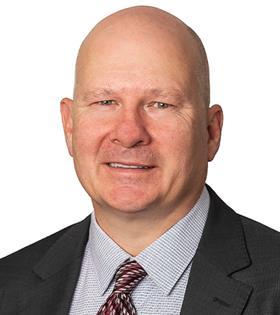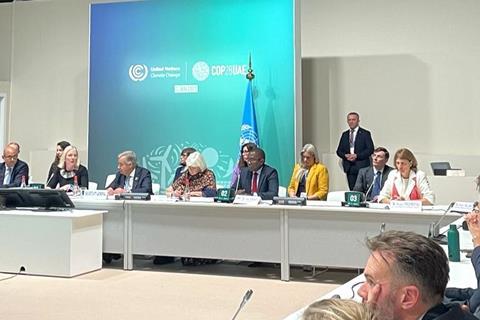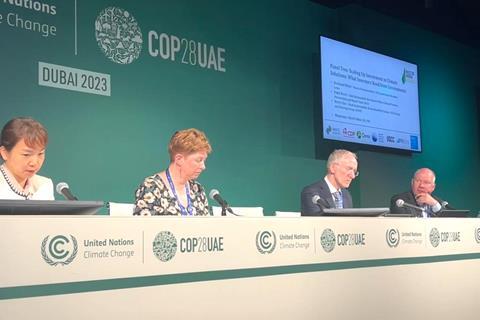By David Atkin, CEO, Principles for Responsible Investment

COP28 is over, marking the end of a busy fortnight that saw the PRI participate in numerous high-level meetings, jointly announce some important evolutions in our work, and actively represent the interests of our signatories.
Reactions on the final agreement keep pouring in – with an unexpected reprieve on the subject of fossil fuels and renewed hope for a 1.5-aligned, resilient future.
Some welcome developments
First, the big headline – the call on Parties to transition away from fossil fuels – is an undeniably significant moment. For too long, governments have dragged their feet on the need to move away from using fossil fuels, even in the face of overwhelming evidence in favour of this action. This is an acknowledgement of the reality we face and the future we should be aiming for. The PRI welcomes this ambition. The consensus we have seen will help to set the agenda for the coming decades of progress, starting with the next round of Nationally Determined Contributions (NDCs).
Our key message for COP28 has been this: governments need to step up their efforts to create an enabling policy environment for investors to fulfil their commitments on climate issues.
Beyond this headline, other welcome developments included the increased recognition of the importance of nature and climate adaptation, as well as some initial progress on loss and damage.
Our ambitions on policy engagement
However – and as before – there’s still much more to be done. We need to focus on raising ambition and implementation by policymakers, not only in delivering on their existing commitments but also in ratcheting up action on NDCs for the future. This includes clarity from policymakers on issues such as phasing out fossil fuel usage in heavy industry and transport. Throughout this transition, the concerns of vulnerable countries on the front lines of climate change must be heard and acted on in these debates, in a just and equitable manner.
Our key message for COP28 has been this: governments need to step up their efforts to create an enabling policy environment for investors to fulfil their commitments on climate issues. We have heard time and again from our signatories that they need our support on policy engagement – and we are acting on that feedback.
Indeed, over the last few years we have seen a significant effort from private finance actors on climate issues. For example, the net zero targets through initiatives such as NZAM and the NZAOA; embedding climate stewardship considerations through Climate Action 100+; there was also growth in parts of the sector where such issues were historically more nascent (evidenced by the PRI-supported Initiative Climat International and its recently launched Private Markets Decarbonisation Roadmap resource for private equity investors) and others. This evolution reflects an acceptance of climate risks as financial risks, and efforts to mitigate these are therefore well within the fiduciary responsibilities of investors.
The new Taskforce on Net Zero Policy

To support and accelerate this action, we need to see governments do more to help investors move more quickly and effectively. Our COP28 Policy Brief has more details, but among other measures we have called for policymakers to:
- pursue foundational financial policy reforms enabling financial flows to align with a pathway towards 1.5°C;
- develop a whole-of-government approach to the transition of the real economy to net zero;
- connect climate mitigation, adaptation and nature policy reforms; and
- align the multilateral financial architecture with sustainability goals.
Aligned with this need for policy action, the PRI is proud to serve as the secretariat for the newly-launched Taskforce on Net Zero Policy. Following the recommendations of the High Level Expert Group’s 2022 “Integrity Matters” report, the Taskforce has been established as a collaborative space to bring together experts and regulators to pursue policy changes which are additive to net zero – both for the investment industry and beyond. Our announcement includes further details, but suffice to say we are privileged to play a role in such important work. It lines up with our drive to facilitate an enabling policy environment and we look forward to working with the partners – and others – currently supporting the project. Watch this space for further announcements next year.
I am heartened by recognition of the role our industry has to play in the process of securing a net zero future, and I remain confident that our ongoing efforts will only benefit further as the global policy and regulatory landscapes further evolve to fully support us.
More opportunities to further our efforts
Our efforts during COP28 and beyond are rooted in a firm belief that collaboration should be at the heart of what we do. In this vein, the PRI supported the launch of the GFANZ Capacity Building Coalition. GFANZ (Glasgow Financial Alliance for Net Zero)’s leadership has been invaluable in developing a community of best practice, and the Coalition is the next logical evolution of its work.
In a similar vein, the Beijing-based Institute of Finance and Sustainability launched the Capacity-building Alliance of Sustainable Investment (CASI). The initiative was first announced during the 3rd Belt and Road Forum in October 2023 and aims to provide quality learning programmes to support countries to develop sustainable finance in the ASEAN (Association of Southeast Asian Nations), Central Asian, African, Middle East, and Latin American regions. Efforts of this nature, which aim to expand global capacity and facilitate responsible investment activity, are essential to moving the work of our industry forward.
The PRI was also happy to support the launch of the Nature Positive Initiative Forum (to foster credible action on the nature positive goal) and unite with governments, private finance and NGOs on the ‘Call for Collaboration on Adaptation’ alongside UNEP FI, the Institutional Investors Group on Climate Change (IIGCC), and the Asia Investor Group on Climate Change (AIGCC).
During COP, I was also pleased to attend a number of meetings and speaking engagements in support of the PRI’s overarching strategic goals. Some key highlights include attending the World Leader’s’ Summit at the start of the Conference, where we heard from government leaders on the need for a truly unified and impactful approach from governments around the world on a number of key topics including nature, forests and oceans, and the High-Level Ministerial Dialogue on the New Collective Quantified Goal.
Investor-related side events

We also convened an official COP side event with our investor network partners (PRI, IIGCC, Ceres, AIGCC, IGCC, CDP and UNEP FI) through our shared Investor Agenda initiative. The Investor Agenda is the forum through which these networks align our complementary efforts, and it was my pleasure to moderate a panel with representatives from Brunel Pension Partnership, Caisse de dépôt et placement du Québec (CDPQ) and SGX Group, alongside network partners and others. Our panel focused on scaling up climate solutions, and we heard valuable input from participants aligned with our core messages on the need for an enabling policy environment for investors. My warm thanks to all who attended and participated in some important discussions.
More broadly, there were valuable opportunities for exchange within the business and finance community, including a dialogue with CEOs on Nature Positive at the Business and Philanthropy Climate Forum and as part of a series of events hosted by GFANZ, where I was pleased to moderate a roundtable focused on the important role of index providers. The United Nations Framework Climate Change Convention (UNFCCC) ‘Public Private Sector Climate Finance Dialogue’ meeting further supported investors and finance policymakers to exchange on what’s needed to create an enabling policy environment.
As our signatory base continues to grow around the globe, these opportunities to meet current and prospective signatories face-to-face and hear how the PRI can support their efforts, are always invaluable
Other finance sector events
A particular highlight this year was our co-hosting of the Sustainable Finance Forum, in collaboration with UNEP FI and Climate Action. This was one of the biggest finance sector events held alongside COP28 and enabled participants the opportunity to foster dialogue, exchange on sustainable practices and enhance collaboration. With over 50 speakers, key themes included the importance of an enabling policy environment, transition plans, blended finance and the just transition, as well as nature and adaptation. My thanks once again to our partners and to all those who participated on the day.
Another key moment was convening a meeting of sovereign wealth funds from around the world - including those from the MENA region - to discuss their activity, how it aligns with the PRI’s, and further opportunities to work together. As our signatory base continues to grow around the globe, these opportunities to meet current and prospective signatories face-to-face and hear how the PRI can support their efforts, are always invaluable. This shapes what we do at a foundational level and I look forward to continuing dialogue with our signatories around the world in the coming year.
A line in the sand
The outcome of the negotiations is a line in the sand and marks an important advancement on where we were when the Conference started. Of course, the job is by no means done. Much more work lies before us. But I am heartened by recognition of the role our industry has to play in the process of securing a net zero future, and I remain confident that our ongoing efforts will only benefit further as the global policy and regulatory landscapes further evolve to fully support us. The PRI is committed to tirelessly advocating for these changes and we look forward to seeing our work continue to make an impact next year.
Allow me to thank you once again for your support in 2023 and to wish you a happy and enjoyable festive break. I look forward to more collaboration and ultimately, more progress for our industry, in 2024.












